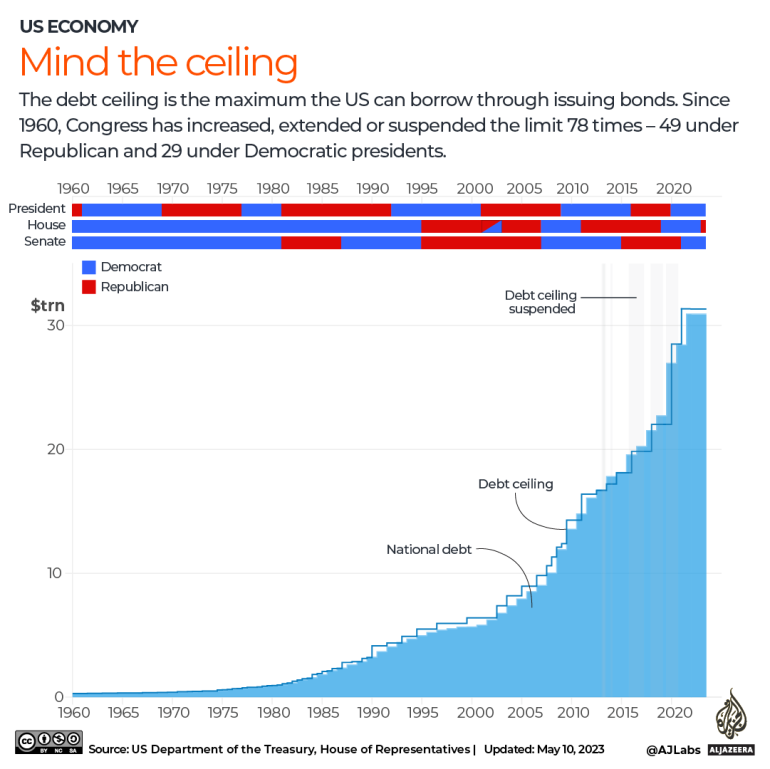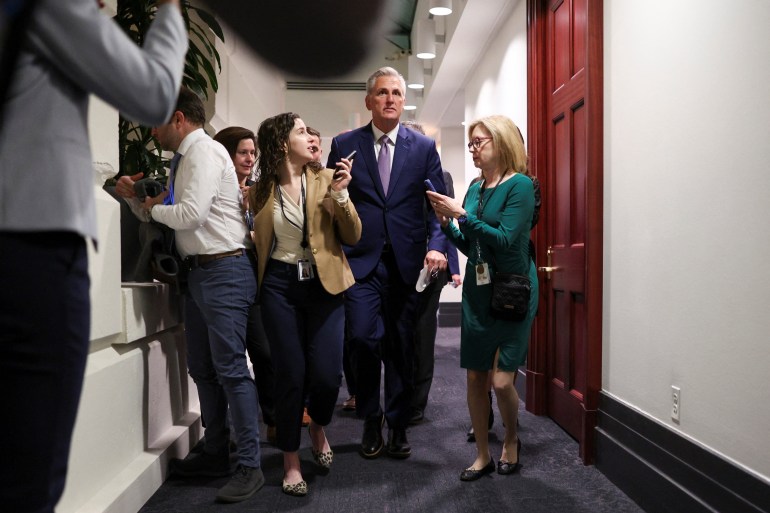What to expect as the US continues with debt ceiling negotiations | Politics News
Tensions are mounting as the deadline for the US to raise its spending limits and avoid a potentially disastrous default looms on the horizon.
Republican House Speaker Kevin McCarthy is meeting US President Joe Biden on Tuesday to discuss potential pathways forward. The United States Department of the Treasury has warned that it could run out of funds to cover the country’s bills as early as June 1.
In US politics, it falls to Congress to raise spending limits and avoid default. McCarthy has said that he will not do so without an agreement to cut spending on social programmes.
The result has been a standoff in which little progress has been made, even as experts have warned that a default could have calamitous effects on the US economy.
“Every single day that Congress does not act, we are experiencing increased economic costs that could slow down the US economy,” Treasury Secretary Janet Yellen said on Tuesday. “There is no time to waste.”
Here are some of the details about who is involved in the debt ceiling negotiations, what can be expected in the days ahead, and what would it mean for the US to default on its debt.
What is the debt ceiling?
The debt ceiling is the US spending limit, currently set at about $31.4 trillion. Typically, raising the government’s spending limits is a routine procedure. But what was once a fairly uncontroversial process has become increasingly politicised over the years.
When was it last raised?
The debt ceiling was last raised in 2021, when Democratic lawmakers in the House and the Senate increased spending limits with little drama.
Today, Democrats control the White House and the Senate, but Republicans have a majority in the House of Representatives.
McCarthy, facing pressure from his party’s right flank, is using Republican leverage over the debt ceiling to push for spending cuts and greater restrictions to programmes such as food assistance for low-income households.
“Avoiding an unprecedented default is a basic duty of Congress,” Biden said in a Twitter post on Tuesday. “And House Republicans know it – they avoided default three times under my predecessor, without once threatening our economy. Default is not an option.”
Avoiding an unprecedented default is a basic duty of Congress.
And House Republicans know it – they avoided default three times under my predecessor, without once threatening our economy.
Default is not an option.
— President Biden (@POTUS) May 16, 2023
What are members of each party saying?
McCarthy and the Republican Party have said that they are trying to rein in government spending.
“We can raise the debt ceiling if we limit what we’re going to spend in the future,” McCarthy told reporters on Tuesday.
Those limitations are largely focused on social programmes, and include proposed work requirements for food assistance.
Republican demands have left the country’s more than $850bn military budget largely untouched. Meanwhile, Democrats have capitalised on the fact that Republican lawmakers have raised spending limits with little fuss when their own party is in power.
“Republicans exploded our debt when they gave huge tax breaks to the rich. Now, they’re refusing to raise the debt limit and pay the bill – risking a global economic catastrophe unless they can gut Social Security, Medicare & Medicaid,” Senator Bernie Sanders said in a social media post in January.
“America cannot default on its debt. If we were to do that it would be catastrophic,” Biden said in a video posted on Twitter on Tuesday. “It’s beyond comprehension. No serious person in either party has ever thought this was an option.”

What happens if the US defaults?
The US defaulting on its debt would be uncharted territory, but experts agree on one key point: Doing so would be deeply unsettling for both the US and world economies.
Treasury Secretary Yellen has previously warned that if the US does not raise the debt ceiling by early June, default would trigger an “economic and financial catastrophe”.
“A default would raise the cost of borrowing into perpetuity. Future investments would become substantially more costly,” Yellen told a group of businesspeople in April.
Last week, the International Monetary Fund (IMF) likewise stated that a US default would have “very serious repercussions” around the world, including a potential slowdown in global gross domestic product (GDP) growth.
If the government is unable to cover its bills after June 1, federal workers could see delays in their pay and the government could struggle to maintain some functions.
What is the status of talks?
Biden and McCarthy met on Tuesday, alongside other members of Democratic and Republican Congressional leadership, the second meeting of its kind in the last week.
Republican Senator John Thune told reporters on Tuesday that there have been “too many cooks” in the negotiations, and that talks should be limited to Biden and McCarthy.
Adding to the difficulty is the fact that McCarthy, who was elected Republican leader of the House after a contentious and drawn-out process after the 2022 midterm elections, is vulnerable to attacks from hardliners within his party.

The president is scheduled to depart on Wednesday for a trip overseas to attend the Group of Seven (G7) summit in Japan, but some lawmakers have called on him to cancel.
“He can’t fly halfway across the globe just as negotiations are gaining momentum,” Republican Senator John Cornyn said in a statement Tuesday.
While Biden has previously sounded a more upbeat note, stating over the weekend that there was “a desire on their part as well as ours to reach an agreement,” the White House said on Tuesday that the president could cut his time at the G7 summit short if further progress is not made.
“We’re working though, thinking through, the rest of the trip right now,” White House national security spokesperson John Kirby told reporters.

Pingback: กระเบื้องทางเท้า
Pingback: Engineering Technicians
Pingback: สล็อตเกาหลี